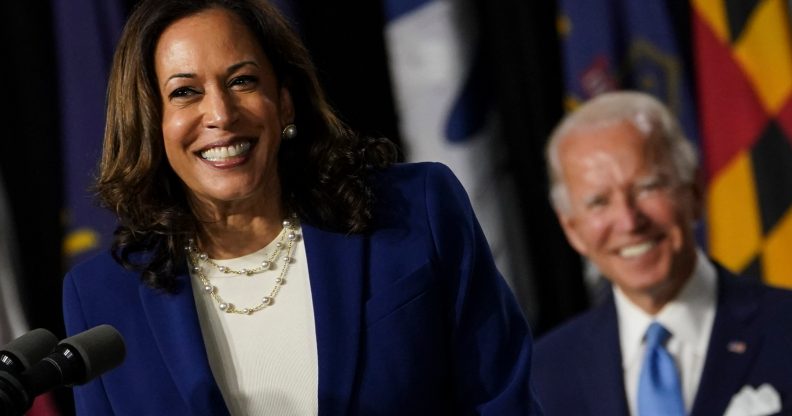Kamala Harris’ complicated record on LGBT+ rights as she finally becomes America’s first female vice president

Kamala Harris and Joe Biden were all smiles at the first public appearance together as running mates (Toni L. Sandys/The Washington Post/Getty)
Kamala Harris has vowed to protect the LGBT+ community as America’s vice president. But her history on queer rights, particularly trans rights, is a complicated one.
At around 5pm GMT (12pm ET) on Wednesday (20 January), Kamala Devi Harris will be sworn in as vice president of the United States.
She will become the first woman, the first Black woman and first Indian-American person to hold one of the nation’s two highest offices, giving millions of Americans reason to celebrate. Among those millions will be members of the LGBT+ community, who powerful ally and a welcome replacement for arch-homophobe Mike Pence.
Like new president Joe Biden, Kamala Harris is a devoted LGBT+ rights advocate who fought for same-sex marriage and has promised to end the epidemic of violence against trans people. She has turned words into actions, and will hopefully continue doing so. And although her record is far from perfect, she appears capable of evolving, as her history shows.
Kamala Harris’ record on LGBT+ rights.
As California’s attorney general, it would have been down to Kamala Harris to defend Proposition 8, the state’s ban on same-sex marriage, in court.
She declined, and later officiated the first same-sex wedding after the Supreme Court ruling which struck it down.
Also while in the role she blocked a “kill the gays” initiative that called for the legal execution of queer people, and helped eliminate the gay/trans panic defence.
Harris continued her advocacy as a US senator, signing friend-of-the-court briefs arguing that trans people should be allowed to use their bathroom of choice and co-sponsoring the Equality Act.
During her bid for the presidential nomination, Harris said that she would pass the Equality Act on her first day in the White House. Biden has pledged it will be passed within the first 100 days – though it’s said Trump’s impeachment trial could delay this.
Trans rights.
Kamala Harris also vowed to end the epidemic of violence against trans women of colour, saying there must be “serious consequence and accountability”.
A note of concern on her record is her 2015 decision to argue that two prisoners should not receive state-funded gender confirmation surgery.
However, during a September 2019 LGBTQ Presidential Forum she argued that she was merely carrying out her job at the time, acting on behalf of her client the California Department of Corrections.
Behind the scenes, she said, she worked with the Department to change its policy regarding trans inmates’ surgeries.
She added: “I commit to you that always in these systems there are going to be these things that these agencies do. And I will commit myself, as I always have, to dealing with it.”
Activist and Pose actor Angelica Ross, who hosted the September event, later commended Harris for holding herself accountable on trans rights.
“In this conversation and several following this one, I called Kamala in to talk about her record on trans people and sex workers and non violent offenders,” Ross recalled.
“She acknowledged her role in collaborating with the state that destroyed many Black lives and shared the moment she realised how she could use her position to change the system while still protecting us from violent offenders, especially those most vulnerable to domestic and intimate partner violence.”
Speaking at another LGBT+ town hall in October, Harris referred back to her own experiences working with the trans community, and again touched on intersectionality.
“When you compound race with being transgender you are doubly exposed, and if you are Latina or Latino and you are an undocumented immigrant, or you are in the system in any way,” she said.
“There’s not a woman in her 20s who is not afraid of being raped,” Harris added, explaining that the same is true for the trans community.
Racial justice and sex work.
As well as the concerns raised around Harris’ record on trans rights, some have also questioned her history regarding sex work and policing.
As attorney general Harris fought to close down a platform many sex workers used to vet potential clients. She was later one of many Democrats in the Senate to support SESTA/FOSTA, a pair of anti-sex-trafficking bills which sex workers have widely criticised, arguing that they prevent them from being able to do their work safely and independently.
Today, however, Harris supports decriminalisation of sex work. She says that her previous stance (she once called decriminalisation “completely ridiculous”) was a result of her wanting to criminalise pimps and clients, an explanation which has not assuaged everybody’s concerns.
On policing, Harris used to proudly refer to herself as a “top cop”, a label which now haunts her. She has been accused of standing by as Black people were murdered by police, rejecting pleas to intervene and investigate police shootings, refusing to reform parole programs and enforcing laws which sent a disproportionate number of Black people to prison.
Her position appears to have evolved in recent years however, and in June she spoke about “reimagining how we do public safety in America”. She also drafted the George Floyd Justice in Policing Act with Cory Booker, which seeks to combat racial bias in policing as well as police misconduct and the use of excessive force.

